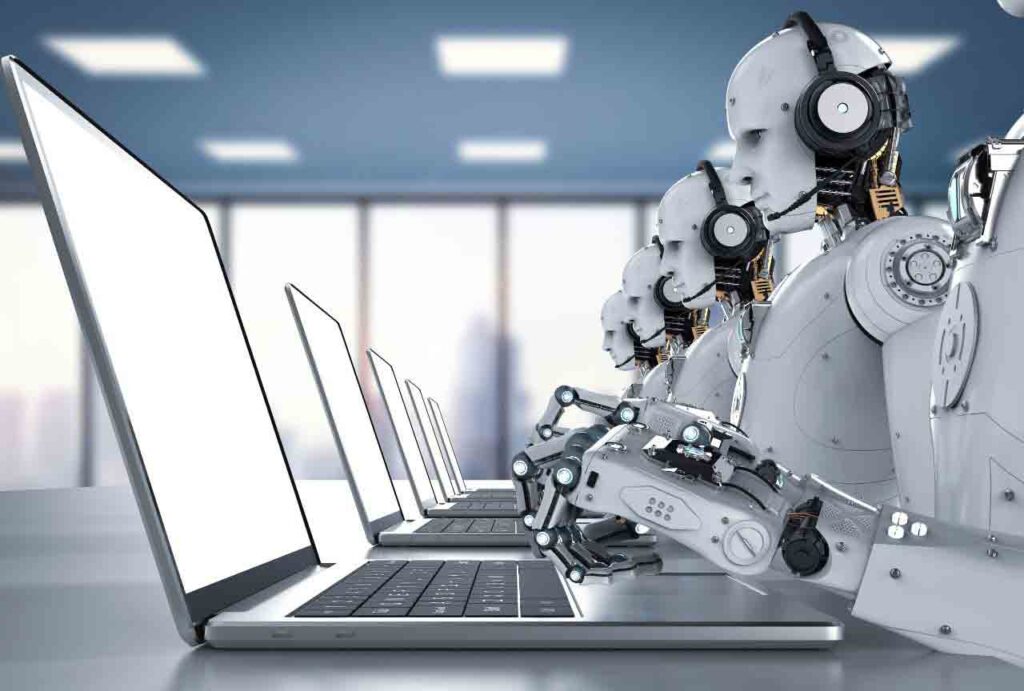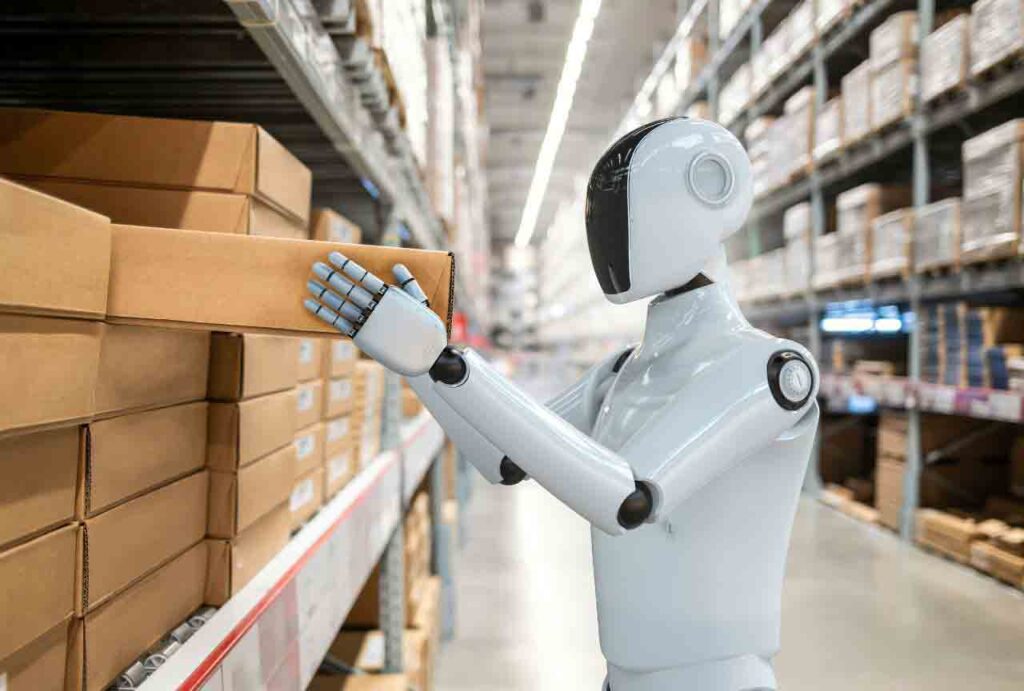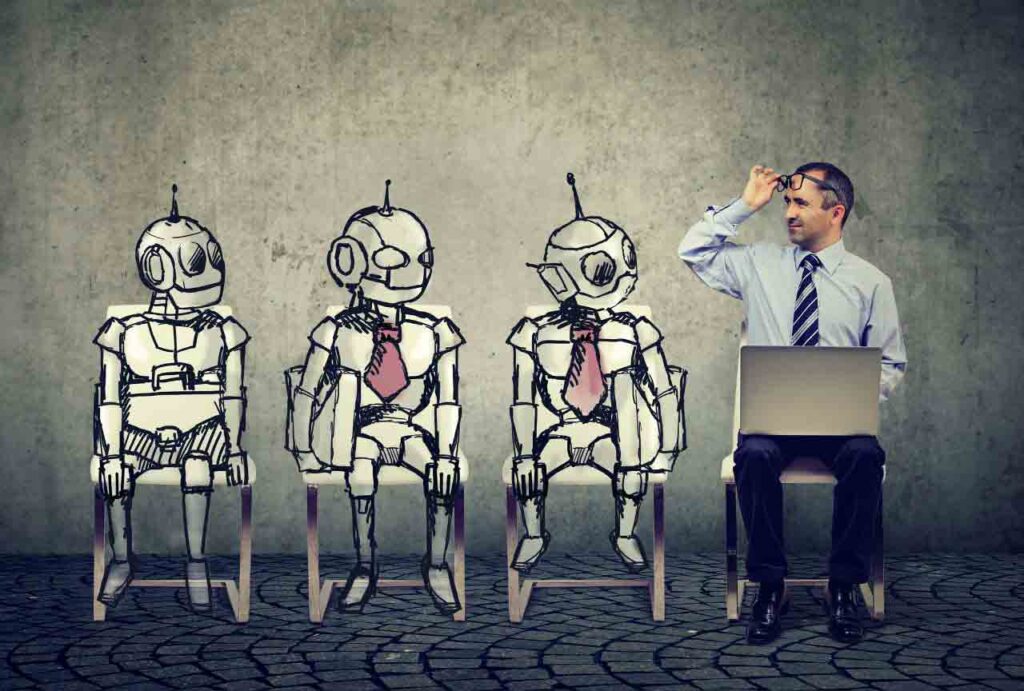The rapid advancement of artificial intelligence is reshaping the professional landscape, creating both opportunities and challenges for workers worldwide. As AI systems continue to evolve, they are demonstrating remarkable capabilities in automating tasks, analyzing data, and even performing creative functions. These developments are leading to significant shifts in demand for certain jobs, with some roles becoming increasingly vulnerable to automation.
Employers and companies are now more willing than ever to adopt AI solutions, recognizing the efficiency and cost savings these tools provide. Hiring full-time employees often comes with significant expenses, including salaries, benefits, and training. In contrast, AI systems can perform tasks with speed and accuracy while reducing overhead costs. This shift in priorities is accelerating the integration of AI across industries, reshaping the job landscape.
I. The 15 Jobs at High Risk of AI
1. Web Developers
Web development is increasingly at risk of automation as AI tools become capable of generating high-quality code, designing websites, and creating user-friendly interfaces. Platforms like AI-powered code generators can produce functional scripts in various programming languages, significantly reducing the need for manual coding. Additionally, AI-driven website builders now provide users with customizable templates and features, bypassing the need for extensive technical expertise. While specialized and highly creative web development may remain in demand, routine tasks and basic website creation are increasingly automated, making this field particularly vulnerable.
2. Paralegals and Legal Assistants
The legal industry is undergoing significant change as AI tools become adept at performing tasks traditionally handled by paralegals and legal assistants. These include document review, contract analysis, legal research, and case preparation. AI-powered software can quickly analyze legal documents, identify relevant information, and even predict case outcomes with high accuracy. This efficiency reduces the demand for human involvement in repetitive tasks, leaving a narrower scope for roles requiring deep legal expertise or nuanced judgment.
3. Writers and Content Creators
The writing and content creation field is experiencing significant disruption due to advancements in natural language processing. AI tools can generate articles, marketing copy, social media posts, and even scripts with speed and accuracy. These systems can adapt to various tones, styles, and topics, producing content that meets the needs of many businesses. While AI may not yet replicate the depth or originality of skilled writers in complex projects, it is already replacing human effort in repetitive and straightforward tasks, putting many traditional writing roles at risk.
4. Customer Support Representatives
AI-driven chatbots and virtual assistants are transforming customer support by providing instant responses and handling inquiries efficiently. These systems can manage large volumes of customer queries simultaneously, offering solutions with accuracy and consistency. As natural language processing improves, AI is becoming better at understanding context and delivering personalized support. Although complex or emotionally sensitive cases may still require human intervention, the ability of AI to handle routine customer service tasks at scale puts many traditional roles in this sector at risk.

Also Read: How To Protect Your Career From AI And Outsmart It
5. Social Media Managers
Social media management, once reliant on human creativity and strategy, is now heavily influenced by AI. Advanced algorithms can schedule posts, analyze engagement metrics, and optimize content for performance without requiring human oversight. AI tools can also generate captions, hashtags, and audience-specific recommendations, significantly reducing the workload for social media teams. While strategic decision-making and trend analysis still benefit from human expertise, the automation of core tasks poses a significant threat to this profession.
6. Financial Analysts
Financial analysis, a field traditionally reliant on data interpretation and market predictions, is being disrupted by AI’s advanced analytical capabilities. AI systems can process large datasets, identify trends, and forecast market behavior with remarkable precision. Additionally, automated investment tools and robo-advisors are replacing many functions previously performed by financial analysts, offering faster and often more accurate insights. As businesses increasingly rely on AI for these tasks, the demand for traditional financial analyst roles is declining, especially in areas that involve standard or repetitive analysis.
7. Graphic Designers for Routine Projects
Graphic design for routine projects, such as creating simple logos, social media graphics, and templates, is increasingly being automated by AI tools. AI-powered platforms can generate visually appealing designs in a matter of seconds, allowing users to select styles, adjust colors, and incorporate brand elements with minimal effort. These tools significantly reduce the need for human input in basic design tasks, making them cost-effective for businesses. While complex and highly creative projects still require human expertise, the automation of routine design work puts many entry-level and repetitive graphic design roles at risk.
8. Medical Transcriptionists
The role of medical transcriptionists is becoming increasingly redundant as AI technology excels in converting spoken medical reports into written text. Speech-to-text algorithms, combined with natural language processing, can transcribe medical dictations accurately and efficiently. These systems can also integrate with electronic health records, streamlining documentation processes for healthcare providers. The ability of AI to handle this work with minimal errors and greater speed poses a significant threat to jobs in this field, particularly for routine transcription tasks.
9. Data Entry Clerks
Data entry roles are among the most vulnerable to AI automation due to the repetitive and rule-based nature of the work. AI-driven systems and robotic process automation (RPA) can efficiently input, verify, and manage large amounts of data with high accuracy, eliminating human errors. These technologies are widely adopted across industries to streamline processes and reduce costs. As businesses continue to implement these solutions, the demand for human data entry clerks is rapidly declining.
10. Retail Cashiers
Retail cashier positions are at high risk due to the increasing adoption of AI-driven self-checkout systems and contactless payment solutions. These technologies provide customers with faster and more convenient shopping experiences, reducing the need for traditional cashier roles. Additionally, advancements in computer vision and AI-powered inventory management systems are enabling stores to implement automated checkout processes that further minimize human involvement. As these technologies become more widespread, the reliance on retail cashiers continues to decrease.
11. Factory Workers and Assemblers
Factory workers and assemblers are highly vulnerable to AI-driven automation due to advancements in robotics and machine learning. Modern manufacturing facilities increasingly use robotic systems that can perform repetitive assembly tasks with exceptional precision and consistency. These robots not only improve efficiency but also reduce operational costs for businesses. AI-powered machines are also capable of detecting and correcting errors in real time, further minimizing the need for human intervention in routine production processes. As automation becomes the norm in manufacturing, the demand for factory workers and assemblers continues to decline.

Also Read: Why Your Job Isn’t Safe and What You Can Do About It
12. Accountants for Basic Tasks
Basic accounting tasks, such as bookkeeping, expense tracking, and tax preparation, are increasingly performed by AI-powered software. Tools like automated bookkeeping systems and AI-driven tax software can process financial data, generate reports, and ensure compliance with regulations with greater speed and accuracy than manual efforts. These systems are also able to identify patterns and anomalies in financial data, providing insights without requiring human oversight. While accountants specializing in complex financial analysis or strategy remain essential, the demand for roles focused on routine tasks is rapidly decreasing.
13. Market Researchers
The field of market research is being reshaped by AI systems that analyze consumer behavior, trends, and market data with unparalleled efficiency. AI tools can process vast amounts of information from multiple sources, generating actionable insights in real time. These systems can also predict consumer preferences and optimize marketing strategies based on historical data. The speed and accuracy of AI-driven market research tools reduce the need for human involvement in data collection and analysis, putting traditional market research roles at risk.
14. Translators for Non-Specialized Work
Translators handling non-specialized or straightforward language tasks are increasingly being replaced by AI-powered translation tools. Advanced algorithms can now translate text and speech in multiple languages with high accuracy, making them ideal for everyday translation needs. These tools are also integrated into communication platforms, allowing real-time translation during conversations. While specialized translation work, such as legal or technical documents, still benefits from human expertise, the demand for translators in routine contexts is diminishing.
15. Travel Agents
Travel agents are facing significant challenges as AI-driven booking platforms and virtual assistants become more advanced. Online tools can now customize travel itineraries, recommend destinations, and compare prices with ease. These systems offer a level of convenience and personalization that has reduced the reliance on human travel agents. As consumers increasingly prefer self-service platforms for their travel planning, traditional roles in this field are becoming less relevant.
Whether your job appears on this list or not, the impact of AI on the workforce is undeniable. The potential for automation to replace human roles is growing, and waiting to adapt increases the risk of being left behind. The key is not to fear these changes but to take proactive steps to protect and advance your career. Focus on building skills that complement AI, explore opportunities in less automatable areas, and stay informed about technological advancements. The future of work will belong to those who evolve with it.



